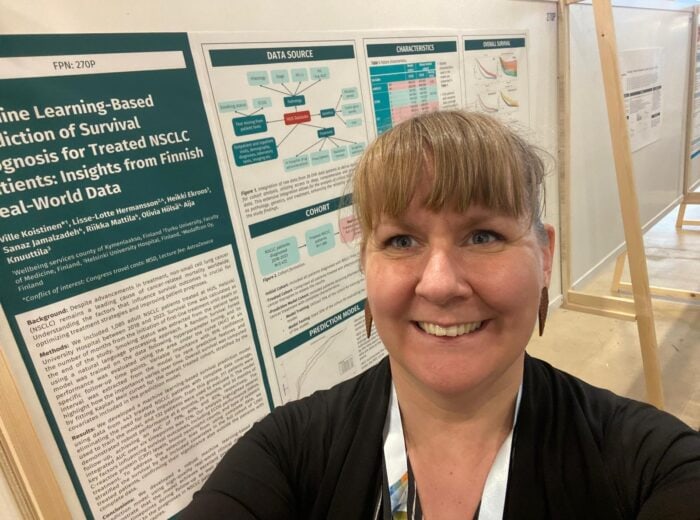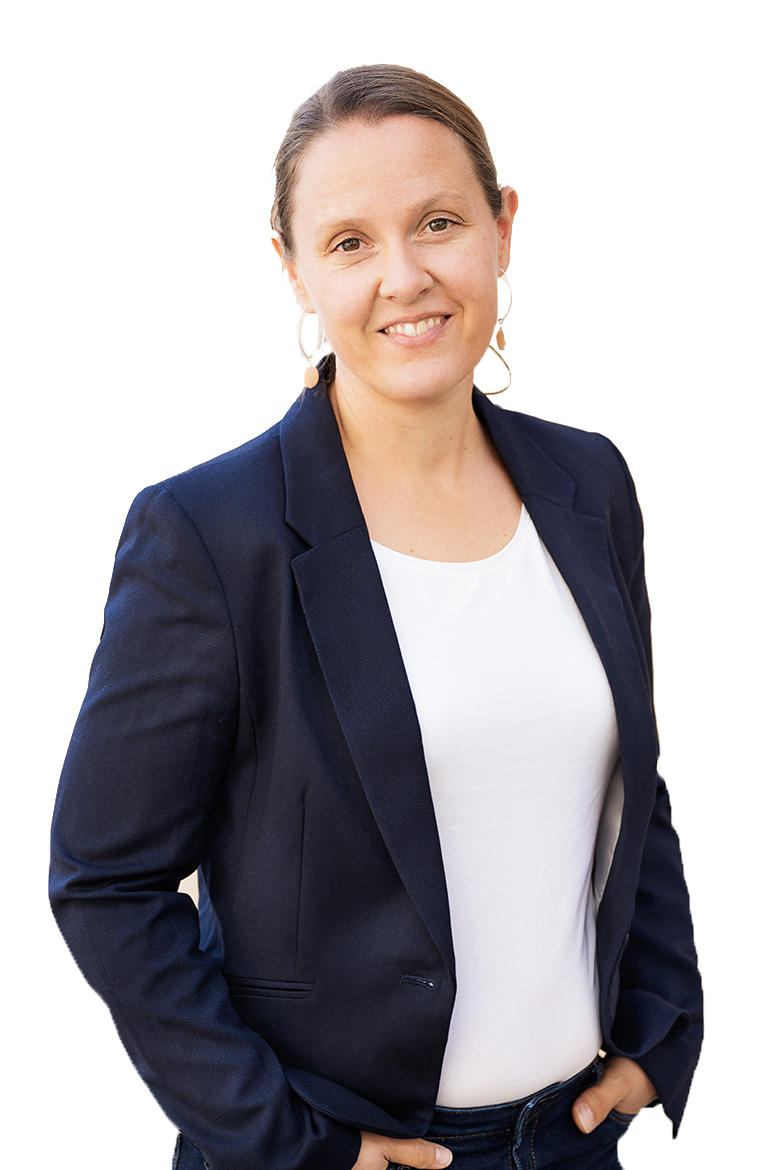Medaffcon Presented Insights from Finnish Real-World Data at European Lung Cancer Congress
Medaffcon's European Lung Cancer Congress (ELCC) poster showcased key findings from a recent study on non-small cell lung cancer (NSCLC).
In the coming years, breakthroughs in neurological and psychiatric drug research are expected to change treatment practices and significantly improve patients’ quality of life. Medaffcon is contributing to this development by conducting, for example, RWE studies (Real World Evidence).
In neurology and psychiatry, new drugs have not been developed as frequently as in fields like cancer treatment.
“The risks involved in investing in drug development for neurological and psychiatric diseases are high, as these are difficult-to-measure conditions and trial have had high failure rates. In cancer there are many existing biomarkers and faster trials,” says Medaffcon’s Scientific Advisor, PhD Riikka Mattila.
Mattila has worked, e.g., at the Neuroscience Center of the University of Helsinki, researching Alzheimer’s disease.
According to Riikka Mattila, Medaffcon can assist pharmaceutical companies in their research in neurology and psychiatry. Real-world data-derived evidence (Real World Evidence, RWE) demonstrates the value of treatment in patient care.
In neurology and psychiatry, Finland’s status as a model country for RWE (Real World Evidence) studies is an advantage. The healthcare system’s data is digital; every citizen has a personal identification number, as is the case in Sweden where Medaffcon’s services are also available; and the research legislation is progressive.
“In the fields of neurology and psychiatry, Medaffcon can manage all RWE (Real World Evidence) and Market Access studies,” says Scientific Advisor and PhD Riikka Mattila.
In neurological and psychiatric research, data is often linked to factors such as income. One’s income can be an essential piece of information, as depression, for instance, may have affected their education and thus their income.
Riikka Mattila highlights that many different facts and socioeconomic data can be excellently extracted from registers in Finland and linked to deep clinical data from hospotals, down to how many cars one owns. The most important sources of information are Statistics Finland and the Finnish Centre for Pensions.
Many neurological and psychiatric disorders are complex conditions that are recorded as text. Interpreting the severity of the disease is challenging. For example, depression is one such condition, according to Riikka Mattila.
In mental health disorders, genetic, biological, psychological, and environmental factors intertwine. The brain and nervous system are complex, and individual differences can be significant.
Gathering information requires text searches and text mining, which Medaffcon can perform to extract complex variables, such as symptoms. Manual data extraction, meaning a doctor retrieves information from the patient record system one by one, is also possible.
“The challenge of text mining is that descriptions in patient records can vary significantly. Fortunately, there has been standardisation in recent years,” says Medaffcon’s Scientific Advisor and PhD Riikka Mattila.
New drugs are coming, for example for treating Alzheimer’s disease. Current treatments for Alzheimer’s disease are symptomatic. The best preventive measures are related to healthy lifestyles and early management of risk factors. No curative drug exists.
Drug research aims to develop so-called neuroprotective drugs, which can slow or prevent the destruction of nerve cells. Thus, they slow the progression of the disease in patients with early-stage Alzheimer’s disease.
The U.S. Food and Drug Administration (FDA) has already approved lecanemab, a new drug suitable for treating Alzheimer’s disease, which can slow memory decline. The European Medicines Agency (EMA) does not recommend marketing authorisation for the drug, as it considers the risks to outweigh the benefits. The risks mentioned include swelling and microbleeds in the brain. Anyway other new drugs for Alzheimer’s disease are in development.
Neurological and psychiatric disorders are very costly to society, and their human impact is significant. The costs and other impacts are direct and indirect. These costs can be assessed through RWE studies (Real World Evidence).
Previously, Medaffcon collaborated with Terveystalo to study the costs of migraine. In Finland, up to 700,000 people deal with migraines. The results showed that migraine patients use 1.7 times more healthcare resources and twice as many sick leave days as others, resulting in substantial costs to society and businesses. The cost of one sick day for an employer is, on average, 300 euros.
“We can always calculate both direct and indirect costs. For example, a person with depression may not complete their education, and there are consequences we can investigate,” notes Medaffcon’s Scientific Advisor and PhD Riikka Mattila.
She emphasises that the impact of major diseases, including Alzheimer’s disease and depression, is significant for society as a whole and individuals.
Illness does not seem to be decreasing. For example, the incidence of early-stage Alzheimer’s disease is steadily increasing in Finland. According to a recent study by the universities of Eastern Finland and Oulu, the incidence of Alzheimer’s disease among working-age people nearly doubled during the 12-year follow-up.
Medaffcon, founded in 2009, is a Nordic research and consulting company specializing in Real-World Evidence, Medical Affairs, and Market Access. With offices in Stockholm, Sweden, and Espoo, Finland, we provide expert services across the Nordic region. Our services combine strong medical and health economic expertise with modern data science.
The company employs some 30 experts. Since 2017, Medaffcon has been a subsidiary of Tamro Oyj and is part of the PHOENIX group, which is a leading provider of healthcare services in Europe.

Medaffcon's European Lung Cancer Congress (ELCC) poster showcased key findings from a recent study on non-small cell lung cancer (NSCLC).

Johan Rehnberg started working as a Scientific Advisor at Medaffcon’s Swedish office in August 2024. He is a dynamic researcher who values opportunities to learn new things and develop his skills – opportunities that Medaffcon provides.

The algorithm was originally developed to extract smoking status from patient texts with purpose to analyze the effects of smoking on postoperative complications. Today, it is also being utilized in lung cancer research.

Sr. Scientific Advisor
RWE Lead
PhD
+358 50 345 2393
mariann.lassenius@medaffcon.com
Mariann joined Medaffcon’s team in 2016 after finishing her PhD. The transition to real world evidence (RWE) research was a natural continuum to her previous research career. Through RWE studies, she has had the privilege to gain a broad insight into working with different stakeholders within the healthcare field. The vast proportion of her days goes towards interacting with clients, planning and performing RWE studies, and supporting Medaffcon’s RWE team. Subjects that keep her work interesting are the vast variability of customers and projects, problem-solving, and interacting with people.
“The number of RWE studies has increased since stakeholders within the healthcare industry have an increasing demand for knowledge-based decision making tools that need to be fulfilled. The future, therefore, has an ever-increasing emphasis on RWE”.